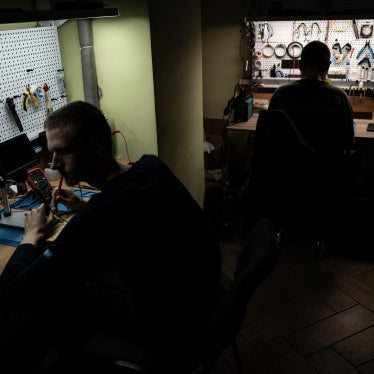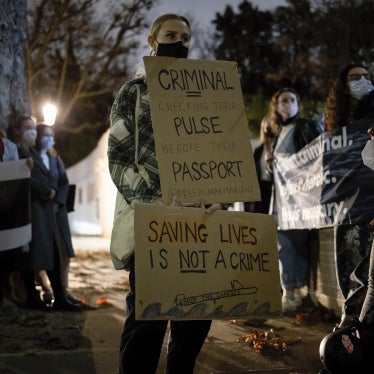(Moscow) – As the 100-day countdown to the 2014 Winter Paralympics begins, there is a dwindling window of opportunity to hold the Russian government to its commitment to establish social integration in the city. In late 2013, months before the Paralympic Games begin, much of Sochi remains an obstacle course for people with disabilities.
The Paralympics will be held in Sochi from March 7-16, following the Winter Olympics in the same city in February. Paralympic competitions will be held in alpine skiing, biathlon, cross-country skiing, ice sledge hockey and wheelchair curling.
Many buildings in Sochi are accessible only in name; almost all of the newly built shopping centers in the city’s bustling Adler market district fail to meet federal standards for accessible construction.
At one clothing store, fluorescent stickers meant to warn people with low vision against colliding with the glass front on the shop were not visible. Social rights activist Alexander Simyonov, who was leading me and other researchers around Adler district in his wheelchair, identified wheelchair logos on the windows of stores and cafes the government had certified as accessible.
The problem was, they weren't.
Simyonov pointed out a grocery store entrance lacking an entrance ramp. Instead, it had a call button for requesting assistance (although the store was small enough for anyone to summon assistance verbally). Simyonov observed that much of what city inspectors deem accessible isn’t actually useful to people with disabilities.
The Russian media optimistically touts government reports about accessibility in Sochi. For example, in October, a local paper cited the Sochi administration’s claim that 990 of Sochi’s 1,801 buildings and public spaces chosen for retrofitting had been made "accessible." Other newspapers reported the government’s promise that the city would be completely barrier-free by the year’s end.
But a visit counters those claims: Sochi’s roads and buildings seem no more accessible for residents with disabilities than those in the five other Russian regions I have visited over the past year. From the Black Sea area of Sochi to Siberia, barriers in Russia remain widespread, despite a progressive federal law mandating that all physical infrastructure be made accessible to people with disabilities.
According to Simyonov, approximately half of the structures the government has announced as meeting federal accessibility norms are pedestrian crossings and public transport stops, many of which remain inaccessible.
Maria, a 26 year-old woman with a physical disability, spends her days inside her Adler apartment because the building lacks a working elevator and entrance ramp. She told me that even if she could leave her building, she would confront another barrier: a pedestrian underpass accessible only by steep staircases, which prevents her from crossing the street to Adler’s downtown.
Pedestrian underpasses are common in Russian cities as a way to cross busy thoroughfares. Simyonov said that the Sochi authorities have outfitted the city’s underpasses with wheelchair lifts that require licensed operators, who typically are absent.
Simyonov noted that many sidewalks lack sloped curbs for wheelchair access, including those where bus stops are located. This means wheelchair users cannot always use the 108 accessible buses the city administration has listed among its key accomplishments, because they can't reach the bus stops.
As a public voice on Russia’s progress, the International Paralympic Committee (IPC) can play a pivotal role in holding Russia accountable for its obligations, as a Paralympic host country, to improve accessibility. Yet the committee has expressed only praise for Russia.
Following a 2012 visit, committee president Sir Philip Craven of the United Kingdom stated that Sochi had become a “blueprint” for Russia and other potential Paralympic Games host cities. In November 2013, Craven admitted that someone venturing into Sochi might encounter inaccessible places, but he added that the IPC believes Russia is “up to the right standard.”
To Simyonov, public praise for Sochi seems undeserved. When we spoke recently, he said the same problems of faulty certification and inaccessibility that he explained during our visit to the city remained.
To its credit, the IPC told Human Rights Watch in a statement that it will call on Russia to expand accessible housing and transportation beyond the Paralympic Village.
The letter also promised the IPC will ask Russia to provide disability awareness training to health and rehabilitation professionals. The body has committed to inviting independent activists such as Simyonov to participate in a forthcoming audit of accessibility in Sochi.
But the IPC should also push Russia to make more meaningful improvements in Sochi and beyond, or at least, to report more accurately on its progress.
Unless observers probe the government’s claims, Sochi’s blueprint will set the bar low for future host cities.








